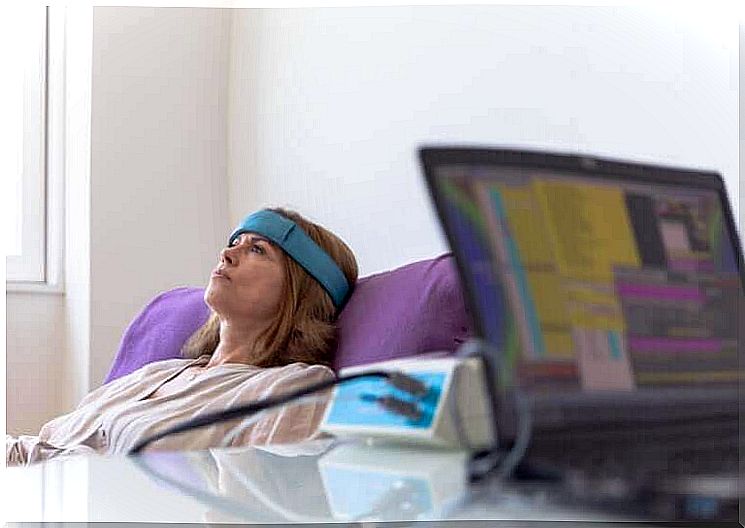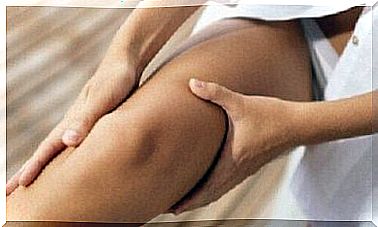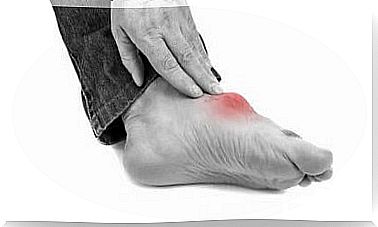Biofeedback: Combating Stress With Relaxation Techniques
Does the term “biofeedback” mean anything to you? In this article, you will find out how beneficial it can be for you to start managing your stress better.

Does the term “biofeedback” mean anything to you? We haven’t talked much about it and yet its benefits are interesting. If you’ve been under stress for a while and nothing has worked for you, it might be time to give it a try.
Biofeedback can help you, but why was this concept chosen? What is he referring to? This is a type of therapy that uses sensors. They are attached to your body and measure your bodily functions to determine your stress level.
How does this help you? Biofeedback allows you to better understand how your body works so that you can deal with this stress. Let us now go much further.
How does biofeedback work?
Biofeedback works in a very simple way. It is based on sensors that are placed in specific places on your body, for example the earlobes or the scalp. The important thing is that they are in contact with the skin.
There is something very interesting about this method. It makes you an active subject. What does that mean ? Biofeedback is not a test in which you do not participate. In this case, you will observe the results displayed on a screen in real time in order to know how you react.
This is why St. Jude Children’s Research Hospital emphasizes that it is an interactive process in which you are able to make a connection with your body that you have never achieved before.
Biofeedback methods
Biofeedback methods are tailored to individual needs. Depending on the health issues you are having, one or the other will be recommended for the best results.
That’s why it’s good to have a personal interview before you undergo biofeedback to find out what you need. Stress can affect you in different ways.

Brain waves
This is one of the recommended biofeedback methods if you suffer from migraines or stress headaches. Sensors will be placed on your scalp or temples and what you will see are brain waves from an EEG.
It’s an interesting way to see how stress affects the brain – it’s pretty amazing!
Breathing
Another method focuses on breathing if stress prevents you from having good breathing dynamics or if you suffer from the feeling of suffocation. Sensors are usually placed on your abdomen and chest to know your breathing pattern and rate.
Heart rate
A heart that beats too fast (tachycardia) can find answers in biofeedback. Thanks to the sensors placed on your chest, lower torso and wrists, you can know your heart rate and its variations. Before stress arrives, your heart may start beating more frequently, getting ahead of itself.
Muscle contraction
Cramps, tight muscles, contractures. Stress can wreak havoc on the body, and biofeedback tackles this problem as well.
Sensors are placed on skeletal muscles to closely observe the electrical activity that causes muscles to contract.
Sweat gland activity
Biofeedback allows you to observe the activity of your sweat glands. As you know, due to stress, you may sweat more than usual or sweat a lot.
Thanks to sensors placed around your fingers or in the palms of your wrists, you will be able to analyze how your body reacts to stress.
Temperature
Finally, another method of biofeedback is measuring your temperature, which tends to drop or sometimes rise with stress. How will your body react? You can find out thanks to the sensors that will be placed on your fingers.
Benefits of biofeedback
Now that you know a little more about biofeedback, you may have noticed its benefits. But we’ll cover them in more detail in this section. The methods described above help you get to know your body better and how it reacts to stress.
What can this help you do? Teach you , for example, to anticipate an episode of stress or anxiety, by calming your breathing and going for a walk to clear your head. This will prevent what you already know is happening to you, from tachycardia, shortness of breath and nervousness to headaches.
Biofeedback is also beneficial in helping you solve your sleep problems, better manage nausea and incontinence (urinary or fecal) which are sometimes related to stress. Some studies report an effect on constipation. Knowing your body will help you be more aware of the management needed.

Contraindications of biofeedback
Despite all the advantages of this type of therapy, it is clear that there will be contraindications. The Mayo Clinic issues the following warnings:
- If you have a skin condition, the sensors used in this type of therapy can cause an allergy. Therefore, if you have a tendency to suffer from eczema or dermatitis, it is best to ask your doctor if it is safe for you.
- If you have heart rhythm problems, biofeedback may not give you promising results in the way you respond to stress. In this situation, we also advise you to discuss this with your doctor.
Choosing a biofeedback practitioner
Are you interested in this technique? Then choose the right practitioner, who must be a licensed therapist. Make sure he can answer any questions you have about the procedure.
Biofeedback has many advantages. If you tried it, how was your experience?









